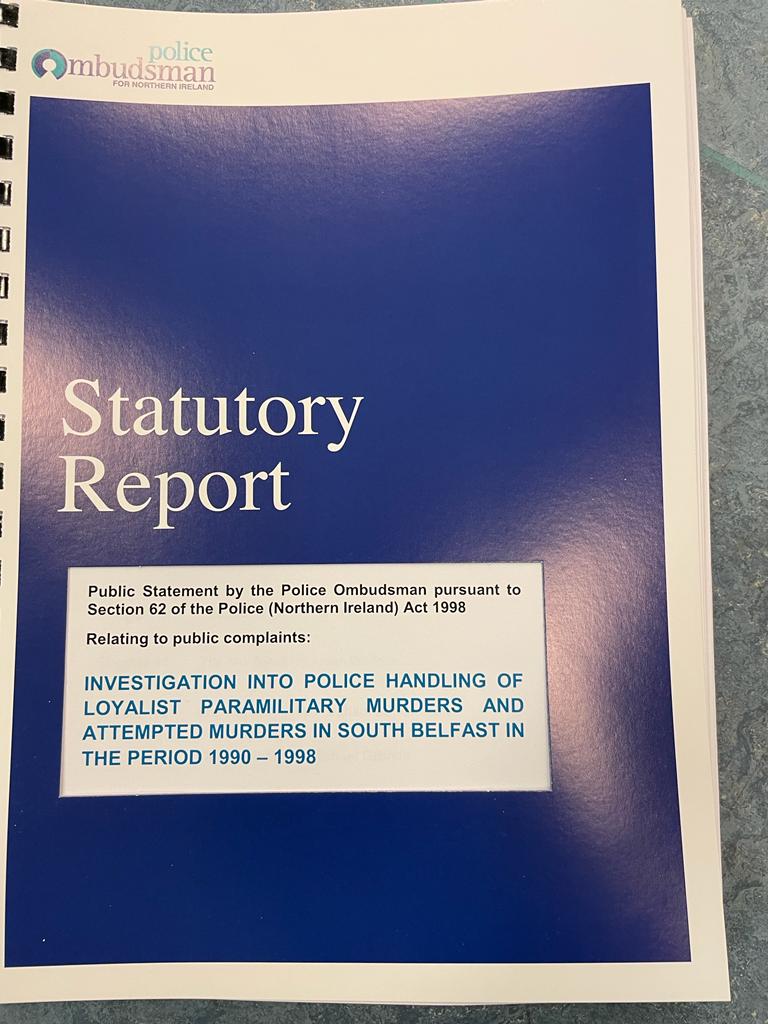In front of Mr Justice Scoffield, a two-day hearing took place (22 and 23 March 2023) challenging the content of three reports issued last year by Marie Anderson, the Police Ombudsman. These outlined in great detail her investigation into the activities of two UDA entities in the late 1980s and early 1990s (the Ombudsman’s Derry 4 report is also under attack). Through this lens, she was investigating how the RUC responded to UDA activity in North Antrim/Co Derry (including attacks in Castlerock and Greysteel) and in South Belfast (including the Ormeau Road bookies attack). Altogether, over 30 deaths were including in the two reports.
The RPOA is seeking to have the reports declared unlawful.
Of particular concern to the RPOA was the focus in the two reports on “collusive activity” enumerated between police officers and the loyalist gangs. This phrase may be used in the reports, argued counsel for the RPOA, David McMillen. But for the press and the public, they understand it to be collusion pure and simple. “There is hardly a more damning statement” in this society, with “immense social consequences applying to it”. Ordinary people won’t define it the way “trained lawyers” might.
Leaning on the statutory basis for the Ombudsman, he argued that going beyond referring likely criminal conduct to the Director of Public Prosecutions and apparent misconduct to the PSNI disciplinary process, the Ombudsman has no power to make determinations as to actions which can not be processed in this way.
The judge was interested in drawing comparisons to the inquest system. In those, the coroner and jury cannot make findings of civil or criminal liability, but they do produce extended findings/verdicts. RPOA however, sought to make distinctions limiting the role and functions of the Ombudsman.
Article 2 (Art 2) of the European Convention of Human Rights (the right to life) was at the heart of the arguments. The RPOA position is that Art 2 calls for an independent and impartial investigation capable of leading to the identification and prosecution of the offender. It doesn’t call for a generalised inquiry which has no part of bringing an offender to justice.
For the Police Ombudsman, Simon McKay, argued that there can be many reasons why people cannot be identified or brought to justice. They may be dead, documents may have been destroyed, many retired officers do not co-operate. But there still has to be accountability and through the public statement, setting out detailed information, she is entitled to draw conclusions from the evidence (or absence of it) in the public interest. Limiting the Ombudsman capacity to report in the way the RPOA sought amounts to attempted censorship: he called the RPOA argument “a myopic proposition” put forward to avoid embarrassment.
On behalf of the Magee family, Sean Devine attacked the RPOA view saying that that organisation had been involved in “a prolonged campaign” seeking to constrain the Ombudsman; this is not surprising given that the series of public statements by the Ombudsman has built on previous reports (Stevens, da Silva etc) and revealed similar collusion. They have gone some way in laying bare the prolonged and sophisticated manner in which RUC officers have assisted loyalists. If the Ombudsman investigators find patterns of behaviour or indications of file management suggestive of misbehaviour related to loyalist activity or where there is non-cooperation she must be allowed to evaluate and report.
Mr Toal on behalf of the Caskey family pointed out that arguing as Mr McMillen had done, that collusion is too sensitive a word for this society, is ludicrous. The failure to warn Mr Caskey that his life was under threat made the actions of loyalists to kill him easier than if he had been warned. In this regard, he drew a comparison between this jurisdiction and England. If the police in England, knowing that a gang member was under threat from another gang, failed to warn him or her, that lacks an element crucial in this jurisdiction; that is that Mr Caskey was perceived by the RUC as an enemy of the state. It is a crucial part of the RUC failure to warn Mr Caskey.
Regarding article 2-compliant inquests, findings can now say that shootings were “unjustified and unjustifiable”, that the force used was disproportionate; all words which point towards civil or criminal liability. The coroner in Ballymurphy described events and drew conclusions. The same should apply to the Ombudsman’s public statements.
Judgment is reserved.











